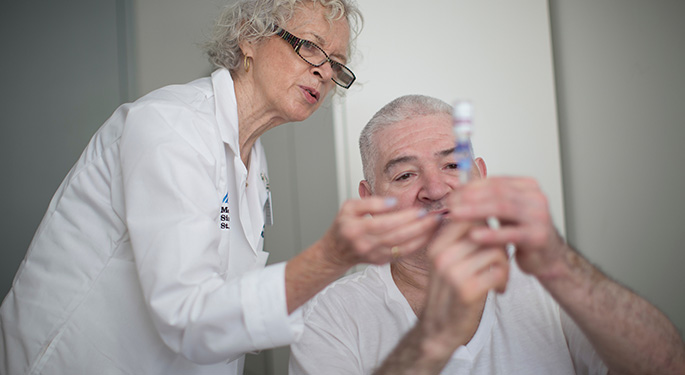Treatment and Care for Diabetes

Managing diabetes can seem overwhelming at first, but there are more resources than ever before to help you manage your diabetes and live a full and active life. Here is a wide assortment of practical resources, ranging from free diabetes smart phone tools to medication assistance programs and community support groups. Our doctors, nurses, and dietary educators at the Mount Sinai Clinical Diabetes Institute would be happy to discuss how you can integrate these resources into your daily life. We have also put together a Guideline for Emergencies to help you prepare for certain situations.
Medications
We can help you manage your diabetes with a combination of oral medications, insulins, injectable medications, and lifestyle changes.
Oral Treatments
If you have type 2 diabetes, our doctors may prescribe a medication taken in pill form. You take some pills once a day and others three times a day. These medications modulate your glucose levels in different ways. Some stimulate the pancreas to make more insulin, others lower glucose production from the liver, slow down absorption of glucose from the digestive system, or decrease insulin resistance in muscle and fat cells. We often prescribe more than one diabetes medication at a time. As with other medications, diabetes medications can cause side effects. It is important to discuss these with your doctor.
Insulins
If you have type 1 diabetes, you will probably need to inject yourself regularly with insulin to control your glucose levels. Somem people with type 2 diabetes also need to do this. You cannot take insulin in pill form because then your stomach would break down the medication before it would have a chance to work.
For a long time, diabetes patients injected insulin using a needle and syringe, measuring out the proper dose each time. Medical advances now offer several other options to choose. These include:
- Injection pens with pre-measured dosages
- Jet injection devices that use high-pressure air to shoot insulin under the skin
External pumps that deliver small doses of insulin at regular intervals
Your doctor and/or diabetes education can tell you more about these different methods and help you choose the one that’s right for you.
There are many types of insulin, which differ by how quickly they start working and how long they continue working in the body. We may prescribe two or more types of insulin to achieve the best possible glucose control. Choosing the right insulin regimen is complicated, but we will work with you to find the best combination for you.
- Rapid-acting insulin, which includes aspart (Novolog), lispro (Humalog), gluulisine (Apidra), is typically taken right before a meal and starts working within 15 minutes. It lasts two to four hours and peaks within 30 to 90 minutes.
- Regular or short-acting insulin, which includes Novolin R and Humulin R, takes effect within 30 to 60 minutes. It lasts three to six hours and peaks within two to three hours.
- Intermediate-acting insulin, which includes NPH, Humulin N, Novolin N, starts working within two to four hours. It is effective for 12 to 18 hours and peaks between 4 to 12 hours.
- Long-acting insulin, which includes glargine (Lantus) and detemir (Levemir), takes effect within an hour and lowers glucose levels steadily over a 24-hour time frame.
- Premixed insulin, which is appropriate if you have poor eyesight or manual dexterity or if you have difficulty injecting insulin from two different bottles, varies in terms of when it starts working, how long it lasts, and the time period when it is most effective.
Injectable Non-Insulin Medications
Insulin is not the only injectable drug used in diabetes treatment. We also use:
- GLP-1 receptor agonists, a class of medications that includes albiglutide (Tanzeum), Exenatide (Byetta), exenatide extended release (Bydureon), and liraglutide (victoza). These medications stimulate insulin secretion when there is glucose in the blood and decrease glucagon production. Common side effects include decreased appetite, weight loss, and nausea. The nausea typically subsides over time.
- Symlin is an amylin analogue that works by slowing gastric emptying, decreasing caloric intake by reducing appetite, increasing feelings of fullness (satiety), and suppressing glucagon production. Common side effects include nausea and weight loss. Again, nausea improves with time.